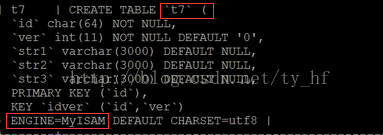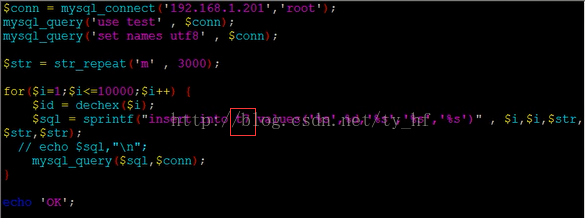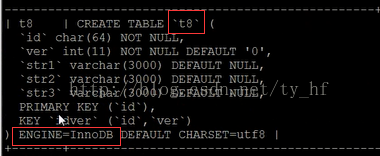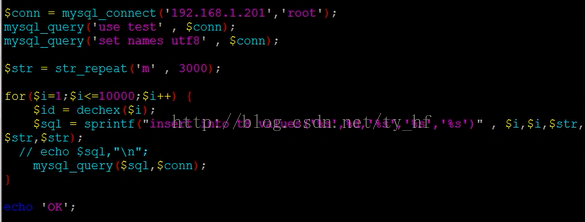Mysql-clustered index slow sorting case analysis
Why should the mysiam engine be used when executing a lot of selects? Especially when there is an index
This article relies on a practical application and analyzes it.
1. Foreword:
I saw an interesting phenomenon on the Internet. A table with 1W data volume executes different orderby conditions and query time. Very big. Is this a real problem in practical applications? ? why?

2. Analysis
a). Situation description:
1. There is primary key id, joint index (id, ver); Using the former for orderby query is slow, while using the latter for orderby query will be very fast;
2. The amount of data in each row is quite large
3.id is the main index, and the fields for select query are also If there is only an ID, then the index is covering it. You don't need to go to the physical disk to retrieve the data. You can get the data you want on the index, but the query that should be faster is slower. Mysql-index coverage
b). Analysis:
is definitely not using the mysiam engine. If so, the speed of query using these two indexes is almost the same, because What is stored in the index is the address of a physical row, and the actual amount of data occupied is not large. But it's different if it's innodb. All the data of the row is stored under its main index.
c). Conclusion:
1. Main reason: The innodb engine
used is a clustered index, and the primary key ID index also hangs the row in the dragnet. Other data, so when sorting along the ID, you have to cross many small blocks to query and traverse each ID; (there is not so much data under mysiam, it will be faster to cross the same data block and traverse more rows)
2. Reason: The amount of data in several fields is relatively large, that is, there are many people dragging their families with their families, and the amount of data is relatively large. The amount of data in each row is large, and it takes up many blocks when storing on disk
3. This problem did not exist in the mysiam engine at that time
d). Mapping conclusion:
When a lot of selects are executed, the mysiam engine should be used.
When a lot of inserts and updates are executed, the innodb engine should be used.
For more conclusions, please see: Mysql-Index Summary
3. Simulation test
Restore the conditions mentioned above, create two tables, control variables, except for the different engines, the other conditions are the same, primary key ID primary index, joint index (id, ver).
1. Create a new table t7, mysiam engine

2. Randomly insert 10,000 pieces of data

3. Execute the query statement and check the time

Obviously, the time difference is not too big , are all of the same magnitude.
4. Create a new table t8, innodb engine

5. Randomly insert 10,000 pieces of data

Interlude, when executing the statement according to the above script, the waiting time is very long. Why? Because it is a clustered index with a primary key index ID, when the primary key index is created, a large number of row data blocks are moved, and there is time for splitting and moving.
The operation is to first delete the primary key index ID, insert the data and then add primary key (id), and then create the primary key index structure

6. Execute the query statement , check the time
Obviously, the time difference is very different.
Reason: Both statements use clustered indexes, but the primary key spans too many blocks, while the joint index is a secondary index with no data underneath, few blocks, and fast traversal.

7. Overall analysis, only the t8 table (innodb) takes a long time to sort according to the primary key index, the rest are okay
Time sorting conclusion: innodb. Primary index> innodb. Secondary index> mysiam
The efficiency is nearly 27 times worse. Where is the problem?
1. The main reason is to do order by sorting along the primary key. The query will span many blocks across pages, and the time will increase
2. If there are not several long char fields, the data block will not be large. , it will not cause such a big difference.
For example, if you delete the str1, str2, str3 fields in the table, the query time will be greatly reduced, and the difference will not be obvious
The above is the content of Mysql-clustered index slow sorting case analysis. For more related content, please pay attention to the PHP Chinese website (www.php.cn)!

Hot AI Tools

Undresser.AI Undress
AI-powered app for creating realistic nude photos

AI Clothes Remover
Online AI tool for removing clothes from photos.

Undress AI Tool
Undress images for free

Clothoff.io
AI clothes remover

Video Face Swap
Swap faces in any video effortlessly with our completely free AI face swap tool!

Hot Article

Hot Tools

Notepad++7.3.1
Easy-to-use and free code editor

SublimeText3 Chinese version
Chinese version, very easy to use

Zend Studio 13.0.1
Powerful PHP integrated development environment

Dreamweaver CS6
Visual web development tools

SublimeText3 Mac version
God-level code editing software (SublimeText3)

Hot Topics
 1652
1652
 14
14
 1412
1412
 52
52
 1303
1303
 25
25
 1250
1250
 29
29
 1224
1224
 24
24
 MySQL's Role: Databases in Web Applications
Apr 17, 2025 am 12:23 AM
MySQL's Role: Databases in Web Applications
Apr 17, 2025 am 12:23 AM
The main role of MySQL in web applications is to store and manage data. 1.MySQL efficiently processes user information, product catalogs, transaction records and other data. 2. Through SQL query, developers can extract information from the database to generate dynamic content. 3.MySQL works based on the client-server model to ensure acceptable query speed.
 How to start mysql by docker
Apr 15, 2025 pm 12:09 PM
How to start mysql by docker
Apr 15, 2025 pm 12:09 PM
The process of starting MySQL in Docker consists of the following steps: Pull the MySQL image to create and start the container, set the root user password, and map the port verification connection Create the database and the user grants all permissions to the database
 Laravel Introduction Example
Apr 18, 2025 pm 12:45 PM
Laravel Introduction Example
Apr 18, 2025 pm 12:45 PM
Laravel is a PHP framework for easy building of web applications. It provides a range of powerful features including: Installation: Install the Laravel CLI globally with Composer and create applications in the project directory. Routing: Define the relationship between the URL and the handler in routes/web.php. View: Create a view in resources/views to render the application's interface. Database Integration: Provides out-of-the-box integration with databases such as MySQL and uses migration to create and modify tables. Model and Controller: The model represents the database entity and the controller processes HTTP requests.
 Solve database connection problem: a practical case of using minii/db library
Apr 18, 2025 am 07:09 AM
Solve database connection problem: a practical case of using minii/db library
Apr 18, 2025 am 07:09 AM
I encountered a tricky problem when developing a small application: the need to quickly integrate a lightweight database operation library. After trying multiple libraries, I found that they either have too much functionality or are not very compatible. Eventually, I found minii/db, a simplified version based on Yii2 that solved my problem perfectly.
 Laravel framework installation method
Apr 18, 2025 pm 12:54 PM
Laravel framework installation method
Apr 18, 2025 pm 12:54 PM
Article summary: This article provides detailed step-by-step instructions to guide readers on how to easily install the Laravel framework. Laravel is a powerful PHP framework that speeds up the development process of web applications. This tutorial covers the installation process from system requirements to configuring databases and setting up routing. By following these steps, readers can quickly and efficiently lay a solid foundation for their Laravel project.
 How to install mysql in centos7
Apr 14, 2025 pm 08:30 PM
How to install mysql in centos7
Apr 14, 2025 pm 08:30 PM
The key to installing MySQL elegantly is to add the official MySQL repository. The specific steps are as follows: Download the MySQL official GPG key to prevent phishing attacks. Add MySQL repository file: rpm -Uvh https://dev.mysql.com/get/mysql80-community-release-el7-3.noarch.rpm Update yum repository cache: yum update installation MySQL: yum install mysql-server startup MySQL service: systemctl start mysqld set up booting
 MySQL and phpMyAdmin: Core Features and Functions
Apr 22, 2025 am 12:12 AM
MySQL and phpMyAdmin: Core Features and Functions
Apr 22, 2025 am 12:12 AM
MySQL and phpMyAdmin are powerful database management tools. 1) MySQL is used to create databases and tables, and to execute DML and SQL queries. 2) phpMyAdmin provides an intuitive interface for database management, table structure management, data operations and user permission management.
 Centos install mysql
Apr 14, 2025 pm 08:09 PM
Centos install mysql
Apr 14, 2025 pm 08:09 PM
Installing MySQL on CentOS involves the following steps: Adding the appropriate MySQL yum source. Execute the yum install mysql-server command to install the MySQL server. Use the mysql_secure_installation command to make security settings, such as setting the root user password. Customize the MySQL configuration file as needed. Tune MySQL parameters and optimize databases for performance.




